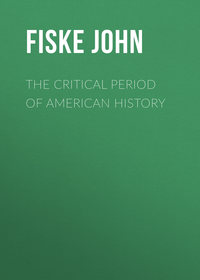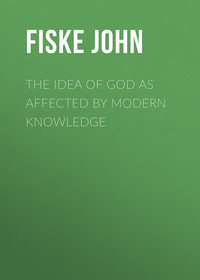 полная версия
полная версияA Century of Science, and Other Essays
The disfranchisement of Catholics was contrary to the spirit of the Rhode Island charter and to the views of Roger Williams, who certainly understood the rational grounds for religious toleration better than any other man of his time, save perhaps Milton and Vane. He represents the Protestant principle of the sacred right of private judgment carried out with unflinching logical consistency. In him the transition from Independency to Individualism is completed. The contrast between the two is illustrated in the controversy between Williams and Cotton which was called forth by the publication in 1644 of Williams's book entitled "The Bloudy Tenent of Persecution." John Cotton was a typical Independent, and by no means a man of persecuting temperament, but his view of the matter is extremely one-sided. He admits that it is wrong for error to persecute truth, but he holds it to be the sacred duty of truth to persecute error! Williams, on the other hand, sees that truth stands in no need of violent or artificial support, and that error contains within itself the seeds of death. He feels, too, that when I venture to persecute what I call error in others, I virtually assume my own infallibility. Thus not until pure Individualism is reached is the fundamental fallacy of Catholicism escaped. In order to protect this sacred Individualism, Williams would have a complete separation between church and state. Under no pretext whatever should the civil government interfere with religious matters. There should be no more statutes against heresy or heretics, no enforced attendance upon public worship, no support of churches by taxation. Roger Williams not only proclaimed such doctrines, but he lived up to them. He never took pains to conceal his dislike of Quaker doctrines; in his seventy-third year he once rowed himself in a boat the whole length of Narragansett Bay, in order to conduct a dispute against three valiant Quaker champions; yet, in spite of vehement pressure from the neighbouring colonies, he resolutely refused to allow the civil power of Rhode Island to be used against Quakers. Massachusetts in fury threatened to cut off the trade of the weaker colony, but nothing could intimidate Williams into what he termed "exercising a civil power over men's consciences." Among the public men of the seventeenth century Roger Williams deserves a preëminent place; he was the first to conceive thoroughly and carry out consistently, in the face of strong opposition, a theory of religious liberty broad enough to win assent and approval from advanced thinkers of the present day.
The separation of church from state, which was effected with such remarkable success in the founding of Rhode Island, did not become general in the United States until after the winning of independence. On this issue the eighteenth century had its memorable struggle, in which the protagonist was Virginia, and the victory was achieved under the leadership of Jefferson and Madison. The early policy of Virginia was to drive out dissentients, or subject them to civil disabilities; and of the Puritans who went thither for a while the greater part left the colony, many of them retreating into tolerant Maryland. After 1660, for three generations the Episcopal folk had it all their own way. But about 1720 began the wholesale immigration of Presbyterians and Lutherans into the Shenandoah Valley, and after the middle of the century trouble began when the tide-water Cavaliers tried to impose taxes upon these people for the support of the Established Church. The most numerous and powerful opponents of this narrow policy were the Presbyterians; and inasmuch as these had come, not from Scotland where their own church was established, but from Ireland where it was persecuted, their experience had led them to approve the separation of church from state. Their political notions were also strongly democratic, and with the aid of their votes Jefferson's party not only abolished primogeniture and entail and other old English customs, but also carried the disestablishment of the Episcopal Church in Virginia. Madison's Religious Freedom Act of 1785, which not only effected this, but likewise did away with all religious tests, is a very important event in the history of the United States. The statute, which declared that "opinion in matters of religion shall in no wise diminish, enlarge, or affect civil capacities," attracted attention far and wide; it was translated into several European languages, and published with admiring comments; and in the course of the next forty years it was imitated by one state after another, until all over the land religious freedom came to be almost as complete as legislation could make it. The qualifying adverb is still needed; for, by the constitutions of Pennsylvania and Tennessee, no man can hold office unless he believes in God and a future state of rewards and punishments; in Texas, Arkansas, Mississippi, the two Carolinas, and Maryland, belief in God is required; and in Arkansas and Maryland a man who does not believe in God and a future state of retribution is deemed incompetent as a witness or juror.21 Such curiosities of law-making – survivals from a lower state, like the caudal vertebra in man and the higher apes – are common enough in history.
The various stages here mentioned in the progress toward religious toleration, and toward the separation of church and state, are important symptoms of the progress of liberal thought. Of course Madison's Religious Freedom Act could not have been proposed by an Endicott, or sustained by a community that would not endure the presence of Baptists or Quakers. The sketch here given shows an enormous advance in liberal thought in the course of two centuries and a half. But such a survey is far from telling us the whole story. A further inquiry into causal agencies is needed, and the best field for it is furnished by that theocratic Puritanism which cast out Roger Williams, – the Puritanism of the four confederated New England colonies, and especially of Massachusetts. No one can deny that in Massachusetts, during the nineteenth century, liberal thought has advanced further and has permeated the community more thoroughly than in any other state of the American Union. For at least three generations the intellectual ferment upon which liberal thought in the United States has thriven has come chiefly from Massachusetts. Yet among our colonies which attained social maturity during the seventeenth century there was none which made such emphatic exhibitions of intolerance and bigotry as Massachusetts. She was as clearly and avowedly founded upon an illiberal principle as Rhode Island was founded upon a principle of liberality. The Endicott type of mind is the very antipodes of the Roger Williams type; yet it was in the land of Endicott, and in a congenial soil, that Theodore Parker lately flourished. Whence came so great a change? The answer will remind us that there are two sources from which liberal thought is nourished. The one is the secularized Gallio spirit that deems it folly to interpose obstacles in the way of the natural working of reason and common sense; the other is the intense devotion to spiritual ideals which, in spite of all inherited encumbrances of bigotry and superstition, never casts off its allegiance to reason as the final arbiter. The former spirit is of vast use in the world, although its tendency is to deaden into mere worldliness as typified in a Franklin; the latter spirit may commit many an error, but its drift is toward light and stimulus and exaltation of life as typified in an Emerson. In the darkest days of New England Puritanism the paramount allegiance to reason was never lost sight of; and out of this fact came the triumph of free thinking, although no such result was ever intended.
The aims of the Puritans who settled in New England were not all alike, but one dominant aim with many was the founding of a commonwealth in which church and state should be identified, somewhat after the pattern of the old Hebrew theocracy. To this end the suffrage in Massachusetts and New Haven was limited to persons qualified to receive the sacrament in Congregational churches. This Massachusetts idea was never adopted by Plymouth, and the founding of Connecticut was at least in part a liberal protest against it. In New Haven it was soon suppressed by the act of Charles II. which put an end to the separate existence of the colony. In Massachusetts, where this theocratic policy prevailed for half a century, the result was the growth of an unenfranchised class which came to include four fifths of the community. During the first generation, when the policy was administered by broad-minded, sagacious men like Winthrop and Cotton, its evils were not flagrant. But after 1650, with such fanatics as Norton and the aged Endicott at the helm, it soon became evident that the rulers were at variance on many points with the mass of the people. This was shown with glaring force in the Quaker persecution, when the violence of Endicott's party produced a popular reaction of feeling, which enabled the Quakers to carry their point and remain in the colony in defiance of statutes. It was further shown in the Half-way Covenant and the founding of the Old South Church in 1669, as parts of a movement toward extending the suffrage; and again in the rise of the Tory party under the lead of Joseph Dudley, opposed to the pretensions of the clergy. The magnificent work of the Massachusetts theocracy in resisting the crown throughout the whole reign of Charles II. can never be forgotten. Nothing was ever done in America that contributed more toward the maintenance of political freedom. But in spite of its merits, the faults of the theocracy were such that we cannot regret its speedy overthrow. When that overthrow was effected, by the charter of 1692, there were a great many people in Massachusetts more or less hostile to the kind of Puritanism entertained by their grandfathers, and thus prepared for a more liberal mental habit. There was also a marked secularization of thought, a diminution of interest in theological problems, and a deadening of religious zeal. A wonderful series of changes was set on foot by the writings and preaching of Jonathan Edwards, and the group of revivals between 1735 and 1750 known as "the Great Awakening." Few figures in history are more pathetic or more sublime than that of Jonathan Edwards in the lonely woodlands of Northampton and Stockbridge, a thinker for depth and acuteness surpassed by not many that have lived, a man with the soul of a poet and prophet, wrestling with the most terrible problems that humanity has ever encountered, with more than the courage and candour of Augustine or Calvin, with all the lofty inspiration of Fichte or Novalis. An interesting historical essay might be devoted to tracing the effects wrought upon New England by this giant personality. The Great Awakening, in which he took part, and to which his preaching powerfully contributed, revived the popular interest in theological questions, disencumbered of the ever present political implications of the previous century. In many ways his theories acted as a disintegrating solvent upon the beliefs of the time. For example, the prominence which he gave to spiritual conversion, or what was called "change of heart," brought about the overthrow of the doctrine of the Half-way Covenant. It also weakened the logical basis of infant baptism, and led to the winning of hosts of converts by the Baptists. Moreover, the uses to which Edwards put his doctrine of the will produced a reaction toward Arminianism, which not only affected the teachings of the Baptists, but predisposed many persons to join in the wave of Methodism which was just about to sweep over the country. A similar reaction against Edwards's views of divine justice, reinforced by some first faint inklings of Biblical criticism, pointed the way toward Universalism. Still more, the discussions aroused by Edwards's speculations on original sin and the atonement began to undermine the doctrine of the Trinity and prepare men's minds for the Unitarian movement. No such results would have been possible save in a country where education was universal and the Sunday sermon a favourite theme of discussion. Sooner or later, the perpetual appeal to reason, with the familiar use of metaphysical arguments and citations of Scripture, must lead to novelties of doctrine and to negative criticism; while for the education of the popular intelligence nothing could be more effective. In seventeenth-century Puritanism, therefore, in spite of its rigid narrowness, there were latent the speculations of an Edwards, the further conclusions to which some of them were pushed, the reactions against them, the keen edge of the critical faculty in New England, and much of the free thinking of a later age.
In the course of the eighteenth century some influence was doubtless exercised in America by the English deists, and at the very end of the century by Thomas Paine. There is no reason to suppose that any appreciable effect was produced by the atheism of the French encyclopædists, which was mainly a reaction, largely emotional and aided by the shallowest of metaphysics, against the effete ecclesiastical system in France. It was too remote from American ideas to exert much influence here. The deism of Voltaire found a few scattered admirers. A quiet religion of humanity, which set little store by miracles, or abstruse doctrines, or the divine authority of Scripture, was held by a number of eminent persons of strong prosaic common sense and feeble spirituality, among whom may be named Franklin and Jefferson and John Adams. This phase of free thought was of considerable importance, but the dominant influence in New England down to the rise of the transcendental movement was that which could be traced back to Edwards.
In the early part of the present century, the most advanced phase of liberal thought, represented by the Unitarians in Massachusetts, was trying to hold an utterly untenable position, halfway between narrow orthodoxy and untrammelled free thinking, when the ground began to be cut from under it by the transcendentalists, whose native temperaments, not wanting in kinship with that of Edwards, were stimulated by a brief contact with Kantian and post-Kantian speculation in Germany. In Emerson's poetic soul the result was a seminal influence upon high thinking, in America and in the Old World, the power of which we cannot but feel, but which it is as yet too soon to estimate. In the middle of the century some wholesome destructive work still needed to be done, and it was well done. When German criticism, with the other weapons in the powerful hands of Theodore Parker, freed us from the spectre of bibliolatry, it might indeed be said that the promise of the Protestant Reformation was at length fulfilled. The change wrought in the Unitarian church since Parker began his preaching has been to some extent followed by analogous changes in other churches. On every side, the last quarter of the nineteenth century has been preëminently the age of the decomposition of orthodoxies. Here and there and everywhere they are crumbling into ruins; and as the world has long since left behind the age of trilobites and the age of dinosaurs, so in the world to which we are coming there will be neither a place nor a use for orthodoxies.
For, as I must observe in conclusion, there is all about us a resistless and world-wide influence at work, to which all the temporary and local causes I have mentioned have been but the ministering servants. From age to age, our knowledge is growing from more to more. From the discovery of America, from the astronomy of Copernicus and the physics of Galileo, down to the universal doctrine of evolution in our own time, there has been one grand coherent and consecutive tale of ever enlarging, ever more organized knowledge of the world in which we live. By this enlarged experience our minds are affected, from day to day and from year to year, in more ways than we can detect or enumerate. It opens our minds to some notions, and makes them incurably hostile to others; so that, for example, new truths well-nigh beyond comprehension, like some of those connected with the luminiferous ether, are accepted, and old beliefs once universal, like witchcraft, are scornfully rejected. Vast changes in mental attitude are thus wrought before it is generally realized. Into the new scheme of things old beliefs no longer fit, and are therefore thrown aside and forgotten. Now our orthodoxies are of older date than the goodly fabric of modern knowledge. They are the outcome of more primitive and childlike thinking, they have ceased to fit the world as we know it, and therefore they fade and fall away from us, in spite of all our efforts to retain undisturbed the venerable and hallowed associations. In this inevitable struggle there has always been more or less pain, and hence free thought has not usually been popular. It has come to our life feast as a guest unbidden and unwelcome; but it has come to stay with us, and already proves more genial than was expected. Deadening, cramping finality has lost its charm for him who has tasted of the ripe fruit of the tree of knowledge. In this broad universe of God's wisdom and love, not leashes to restrain us are needed, but wings to sustain our flight. Let bold but reverent thought go on and probe creation's mysteries, till faith and knowledge "make one music as before, but vaster."
October, 1895.
VI
SIR HARRY VANE 22
With the single exception of Cromwell, the greatest statesman of the heroic age of Puritanism was unquestionably the younger Henry Vane. He did as much as any one to compass the downfall of Strafford; he brought the military strength of Scotland to the aid of the hard-pressed Parliament; he administered the navy with which Blake won his astonishing victories; he dared even withstand Cromwell at the height of his power, when his measures savoured too much of violence. After the death of Pym in 1643, Sir Henry Vane, then thirty-one years of age, was the foremost man in the Long Parliament, and so remained as long as that Parliament controlled the march of events. As Baxter said, "he was that within the House that Cromwell was without." Yet before the beginning of his brilliant career in England, this young man had written his name indelibly upon one of the earliest pages in the history of the American people. It is pleasant to remember that this admirable man was once the chief magistrate of an American commonwealth. Thorough republican and enthusiastic lover of liberty, he was spiritually akin to Jefferson and to Samuel Adams. His career furnishes an excellent illustration of Mr. Doyle's remark, that "by looking at the colony of Massachusetts, we can see what sort of a commonwealth was constructed by the best men of the Puritan party, and to some extent what they would have made of the government of England if they could have had their way unchecked."
An adequate biography of this great statesman was a thing much to be desired. Half a century ago Mr. C. W. Upham contributed to Sparks's "American Biography" an interesting life of Vane; and about the same time Mr. John Forster, in his "Statesmen of the Commonwealth," made a sketch characterized by his usual brilliancy. But both these writers indulged themselves in that kind of indiscriminate eulogy which used in those days to be thought necessary for biographers; and by way of foil to their hero they seemed to feel bound to underrate and misinterpret Cromwell, even as Carlyle seemed to think he was exalting the great, Protector in belittling Vane. The remarkable advance in fairness and breadth of view which historical studies have made within the last fifty years is nowhere better illustrated than in the spirit in which the seventeenth century in England is treated by Masson and Gardiner as contrasted with Macaulay. It is no longer the fashion to depict individuals or parties as wholly saintlike or quite the reverse, and it is beginning to be practically recognized that there are two sides to almost every question.
The need for an adequate life of Sir Harry Vane has been most thoroughly and admirably satisfied by Mr. Hosmer. As a biography and as a historical monograph, it deserves to be ranked among the best books of the day. It paints a lifelike picture of the man, and it describes, in a broad, generous spirit and with keen philosophical insight, the causal succession of events in one of the most momentous political contests the world has ever seen. We are getting far enough away from the seventeenth century to realize the critical importance of the struggle in which kingship was struck down in England just as it was attaining unchecked supremacy in all the other great nations of Europe. We can put the Great Rebellion into its proper place in the series of conflicts which have so far resulted in spreading constitutional government far and wide over two hemispheres; and we can begin to see how disastrous in its consequences would have been the victory of the Cavaliers, true and gallant men as most of them doubtless were. Without dealing too much in generalities, Mr. Hosmer's narrative keeps before us the gravity of the issues at stake, while our attention is seldom drawn away from the powerful but quiet and gracious personality that occupies the centre of the canvas. It is customary for great eras to live in the twilight of popular memory in association with some one surpassing name, while other heroes of the time are dimly remembered or quite forgotten. The work of these other men gets unconsciously transferred to the credit of the most brilliant or striking hero, as Hamilton, for example, is apt to get associated not merely with his own all-important achievements, but likewise with those of Madison and the Federal Convention generally. In accordance with this labour-saving habit of mind, the Great Rebellion in popular memory means Oliver Cromwell, while such men as Eliot and Pym, Fairfax and Ireton, are passed over; and if Hampden stays, it is partly due to the often-quoted line of the poet Gray. So there are many who know Vane only through Milton's sonnet, – itself perhaps the noblest literary tribute ever paid to a statesman. In Mr. Hosmer's pages Sir Harry lives again, one of the brightest figures of the Puritan age, cheerful and affectionate, full of sacred enthusiasm, yet shrewd and self-contained. "He was indeed a man of extraordinary parts, a pleasant wit, a great understanding which pierced into and discerned the purposes of men with wonderful sagacity, whilst he had himself vultum clausum, that no man could make a guess of what he intended." So says Clarendon, who loved him not, but could not help admiring the skill which, at the most critical moment of the war, when many stout adherents of the parliamentary cause were inclined to abandon it as lost, all at once brought light out of darkness, as the signing of the Solemn League and Covenant summoned Alexander Leslie and twenty thousand brawny Scots across the border to stand side by side with Cromwell and Fairfax at Marston Moor. In later days it became matter of common report that the northern Covenanters had fallen a prey to the wiles of "that sweet youth," and allowed themselves to be hoodwinked and cozened by "sly Sir Harry," until, in the hope of establishing Presbyterianism south of the Tweed, they lent themselves to the work of setting the monster Independency upon its feet. Mr. Hosmer carefully examines this charge, and, we think, successfully refutes it. It was neither the first nor the last contract on record which has afterward come to receive conflicting interpretations from the two parties without any tricksome intent on either side. "The Scots," says Mr. Hosmer, "understood that England assumed their own narrow Presbyterianism, with its complete intolerance; Vane and his friends gave the instrument a different interpretation, which they honestly felt it would bear." The amendments which Vane partly succeeded in engrafting upon the Scottish proposals at Edinburgh are sufficient evidence of his straightforwardness. It was plain enough that, in making a league to overcome the King, the Scots wanted one thing, while the English wanted another. Vane did not hide this fact; to have emphasized it would have been to forfeit all claim to diplomatic tact. His part in the memorable negotiation is tersely summed up by Clarendon: "Sir Harry Vane was one of the commissioners, and therefore the others need not be named, since he was all in any business where others were joined with him." In the Committee of Both Kingdoms which the league created he was equally effective, and it was mainly through his persistent dexterity that the committee acquired the control of military affairs, and thus gave to the operations of the parliamentary army that unity which they had hitherto lacked.







